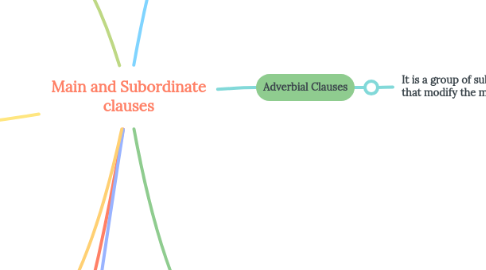
1. Compound
1.1. 1. Susana has just graduated and is going to live abroad.
1.2. 2.My best friend was sad lately so she decided to go to therapy.
1.3. 3.My brother came to visit me yesterday but I wasn't home.
1.4. 4. The boss explained the project only for certain employees.
1.5. 5. My neighbor got COVID so he decided not to leave the house.
2. Compound-complex
2.1. 1. Laura forgot her friend's birthday, so she sent her a card when she finally remembered.
2.2. 2. Though Alex prefers watching romantic films, he rented the latest spy thriller, and he enjoyed it very much.
2.3. 3. Although Sofia was unable to attend the concert, she was happy because her brother bought her a blouse.
2.4. 4. Vanessa doesn't like horror movies because she gets too scared, so she doesn't watch them.
2.5. 5. The dog started barking so the cat ran away and I couldn’t keep up, so I stopped.
3. Relative Clauses or Adjective Clauses
3.1. Relative Clause can be introduced by relative pronouns such as where, who, which, whose
3.1.1. Restrictive Clauses
3.1.1.1. They are used to give necessary information to define the meaning of the noun phrase.
3.1.1.1.1. 1. The boy who helped you is my boyfriend.
3.1.2. Non-restrictive clauses
3.1.2.1. Provide information about the person or thing mentioned in the noun phrase, but this information doesn't restrict the noun phrase.
3.1.2.1.1. 4. Marlene, who has just finished high school, is an extraordinary painter.
4. Complex
4.1. 1. Erick was helping me paint the wall when his brother fell down.
4.2. 2. Karina didn't want to go out dancing because she is sick.
4.3. 3. I will call you as soon as I arrive.
4.4. 4. I will bring you back here whenever you want.
4.5. 5.My mom called me before she left.
5. Adverbial Clauses
5.1. It is a group of subordinate clauses that modify the main clause.
5.1.1. Time
5.1.1.1. Before/ While/ Until
5.1.1.1.1. 1. You can help me fix up the house before you leave.
5.1.2. Time and reason
5.1.2.1. Since/ Because
5.1.2.1.1. 3. Sheila feels sad because her mother didn't give her permission.
5.1.3. Manner and comparison
5.1.3.1. As if/ As though/ As ... as
5.1.3.1.1. 5. My mother treats me as if I were a child, not an adult.
5.1.4. Purpose
5.1.4.1. So that
5.1.4.1.1. 6. She worked hard so that she would would pass the exam.
5.1.5. Concession and Contrast
5.1.5.1. Although
5.1.5.1.1. 7. Although I don't have money, I will go to this concert.
5.1.6. Contrast
5.1.6.1. Even though
5.1.6.1.1. 8. She says she still loves him even though he treats her badly.
5.1.7. Result
5.1.7.1. So
5.1.7.1.1. 9.It's been quite a long day, so I'm very tired now.
5.1.8. Condition
5.1.8.1. If
5.1.8.1.1. 10.If you don't hurry, you will miss the bus.
6. Complement or noun clauses
6.1. A complement clause is introduced by completmentizer like that or wheter.
6.1.1. Complement of a verb
6.1.1.1. 1. Many students don't know whether they will have to virtual class on Monday.
6.1.1.1.1. 2. The judge argued that the client was not found in possession of contraband.
6.1.2. Complement of an adjective
6.1.2.1. 3. I'm surprised that you like it.
6.1.2.1.1. 4. I'm happy that you won the competition.
6.1.3. Complement of a noun
6.1.3.1. 5. The fact that he did not attend this important meeting speaks volumes about his job responsibility.
